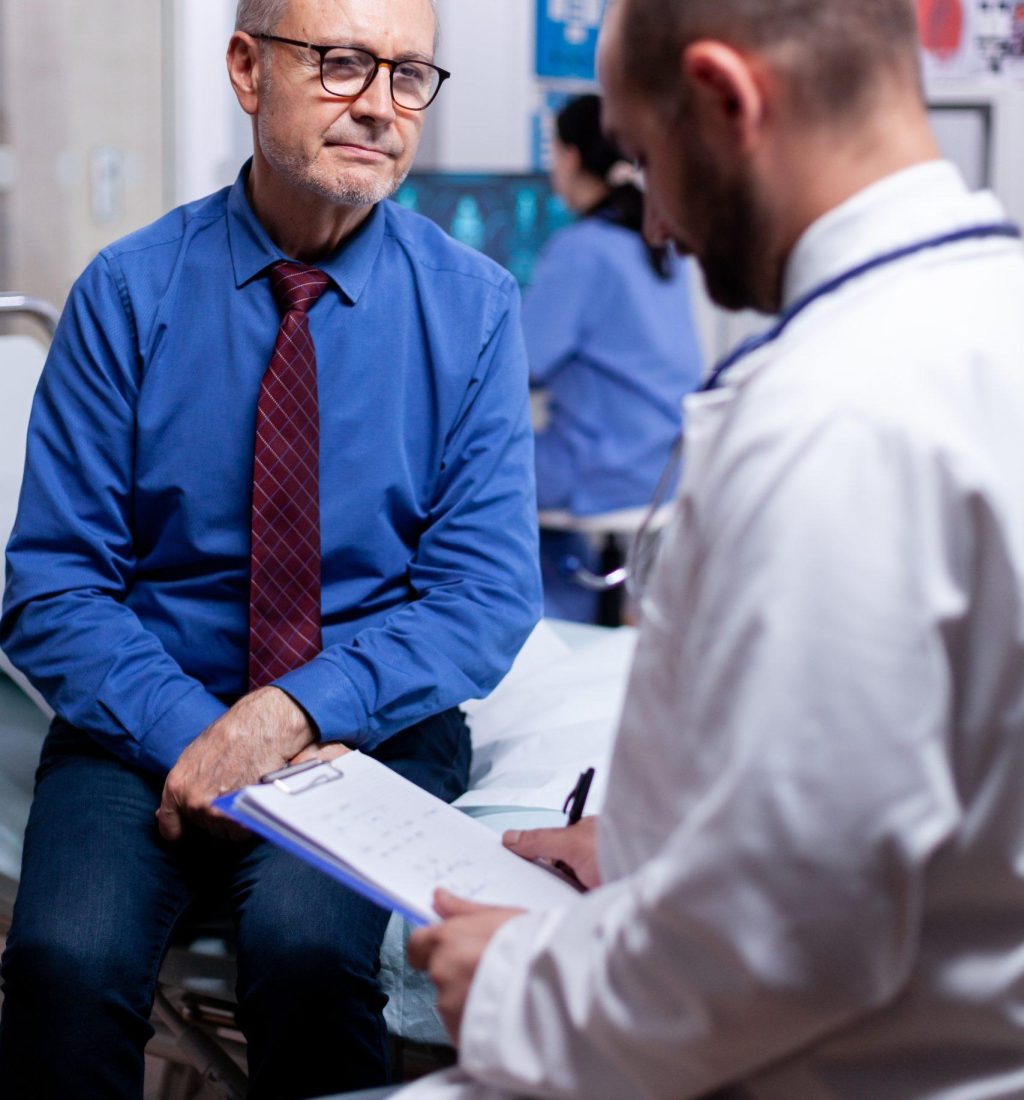Constipation Cancer Treatment in Hyderabad

Constipation is a common digestive issue in which there are less frequent or difficult bowel movements, causing discomfort and straining during the passage of stool. It generally means having fewer than three bowel movements in a week, typically associated with the passage of hard and dry stools.
Constipation is commonly caused by insufficient dietary fibre intake and fluid intake, but sometimes it can also be a symptom of an underlying condition or a side effect of medication.
If you have been experiencing long-term constipation, consult with the surgical gastroenterologist for constipation treatment in Hyderabad to determine its cause and receive the appropriate treatment.
What are the symptoms of Constipation?

Symptoms can vary from person to person since everyone’s bowel habits are different. While some individuals may have bowel movements three times a day, others may go three times a week. If you’re experiencing the following signs, you might be constipated:
- Having fewer than three stools a week.
- Passing hard, dry, or lumpy stools
- Straining or feeling pain during bowel movements.
- A feeling of fullness, even after having a bowel movement.
- A feeling that your rectum is blocked.
- Feeling bloated and nauseated.
According to the National Institute of Diabetes and Digestive and Kidney Diseases (NIDDK), it is recommended to consult a doctor for constipation treatment if your symptoms persist or you notice the following signs:
- Blood in your stool.
- Bleeding from the rectum.
- Persistent stomach pain or cramps.
- Inability to pass gas.
- Lower back pain.
- Vomiting.
- Fever.
- Weight loss without trying.
- Sudden changes in bowel movements.
Chronic constipation, along with the above-mentioned signs and symptoms, may require treating another disease or condition that can cause or worsen constipation.
Gastroenterologists conduct tests to rule out more serious conditions like colorectal cancer or irritable bowel syndrome (IBS)[1] .

Causes of Constipation
Constipation can result from various factors, including lifestyle choices, medications, and underlying health conditions.

Lifestyle factors:
- Inadequate fibre intake.
- Insufficient water consumption.
- Lack of physical activity.
- Changes in routine, like travel or alterations in eating and sleeping patterns.
- Excessive consumption of dairy products.
- Stress.
- Ignoring the natural urge of passing stool.
Medications:
Certain medications may contribute to constipation, such as:
- Strong painkillers.
- Antidepressants
- Antacids
- Iron supplements.
- Allergy medications
- Certain blood pressure medications

- Psychiatric medications
- Antiseizure medications
- Antinausea medications
Medical conditions:
- Certain conditions like diabetes, stroke, and Parkinson’s disease.
- Colon or rectum problems such as IBS, intestinal obstruction, and diverticulosis.
- Problems with weakness or coordination of pelvic floor muscles.
- Endocrine problems such as underactive thyroid gland (hypothyroidism), uremia and hypercalcemia.
- Pregnancy
Sometimes, the cause of chronic constipation can’t be found, thus it is crucial to seek advice from the best doctor for constipation treatment in Hyderabad. They will recommend certain tests to determine the cause and provide prompt treatment. A delay in treatment can lead to complications.
Complications of Chronic Constipation
- Haemorrhoids, swollen tissues around the anus.
- Anal fissures, torn tissues of the anus.
- Faecal impaction, hard stools backed up into the colon.
- Rectal prolapse, rectum slipping out of the anal opening.
- Stress urinary incontinence, bladder leakage due to prolonged strain.

What to Expect During the Visit to the Doctor for Constipation Treatment in Hyderabad
When you visit the doctor for constipation treatment, it is important to communicate openly about your symptoms and concerns. You can expect a thorough evaluation, including the following:
Physical Examination
- The doctor will conduct a general physical examination.
- May gently press on your abdomen to check for pain, tenderness, or irregular lumps.
- Examine the tissue around the anus and surrounding skin.
- May also assess the condition of the rectum and the muscles of the anus.
AFP is a protein that can be elevated in individuals with liver cancer. Periodic AFP blood tests may be recommended to monitor for any significant changes in levels.
Medical History and Lifestyle Questions
You will be asked about your medical history, dietary habits, exercise routines, and details about your bowel movements. If needed, additional tests may be recommended to understand the nature or cause of
constipation such as:
Blood tests and urine tests, to determine signs of hypothyroidism, anaemia, and diabetes.
A stool sample may be taken to check for signs of infection, inflammation, and cancer.
An endoscopy may be done. In this procedure, a tube with a camera is guided into the colon to examine its condition and detect irregular tissues. Types of endoscopy include colonoscopy (examining the entire colon) and sigmoidoscopy (examining the lower part of the colon).
Imaging tests such as computed tomography (CT) scan, magnetic resonance imaging (MRI) scan, or lower gastrointestinal tract series may be recommended to diagnose conditions that may be causing constipation.
Colorectal transit studies including radiopaque marker studies and scintigraphy, may be conducted to track the movement of stool through the colon.
Other bowel function tests such as certain types of X-ray (defecography) may be done to rule out causes of outlet dysfunction constipation. Balloon expulsion test and anorectal manometry may also be conducted to evaluate the function of the muscles in the rectum and colon.
Other bowel function tests such as certain types of X-ray (defecography) may be done to rule out causes of outlet dysfunction constipation. Balloon expulsion test and anorectal manometry may also be conducted to evaluate the function of the muscles in the rectum and colon.
Treatment for Constipation in Hyderabad

Constipation can often be managed at home by making simple lifestyle changes.
- Increase your intake of high-fiber foods, such as fruits and vegetables, and ensure you drink enough water.
- Adults should aim for 22 to 34 grams of fibre daily.
- Engage in regular physical activity to relieve the symptoms.
If you experience constipation after taking certain medications, consult your doctor to adjust doses or consider alternative options.
Try Bowel Training. This involves establishing a routine for bowel movements at the same time each day to help in becoming regular. For instance, having a bowel movement 15 to 45 minutes after breakfast may be helpful, as eating aids your colon in moving stool. Ensure to allocate enough time for a bowel movement and use the bathroom as soon as you feel the need to go.
If self-care measures are ineffective, the doctor may prescribe medications and supplements. Biofeedback therapy can be recommended for muscle control issues, helping retrain muscles.
As the last resort, surgery may be considered for severe cases with complications like rectal prolapse or dysfunctional colon muscles.
Takeaway
Constipation is a common concern, especially with age, specific medications, or a low-fiber diet. But, with changes in diet and exercise, most cases of constipation can easily be treated.
If you’re experiencing chronic constipation or constipation along with other bowel changes, consult Dr. K V Dinesh Reddy, one of the best gastroenterologists in Hyderabad known for effectively treating disorders related to the digestive system, including constipation.
Best Doctor for Constipation Cancer Treatment in Hyderabad

Dr. K V Dinesh Reddy
MBBS; MS (Gen.Surg); DNB (Surg.Gastro)
It is always advisable to consult with an experienced doctor for personalized advice and an accurate diagnosis. Dr. K V Dinesh Reddy is known for his expertise in Constipation cancer treatment in Hyderabad. With a proven track record of performing multiple liver cancer surgeries, he specializes in liver disease management and gastrointestinal oncological surgeries.
You can trust our expertise and dedication to providing exceptional care for your colorectal cancer treatment.
Frequently Asked Questions
Here are answers to some of the questions you might have about Liver Cancer
To help with constipation, eat more fruits like apples, pears, and berries; veggies such as broccoli, carrots, and spinach; and whole grains like oats and brown rice. Drink lots of water to stay hydrated, and have prunes or prune juice. These foods make your poop softer and easier to handle. Don’t eat too much processed or fatty stuff. Move around and exercise regularly to keep your belly happy. Just remember, a balanced diet with fiber, water, and moving around helps you go to the bathroom more easily and keeps constipation away.
To prevent constipation, it’s important to drink plenty of water. A general guideline is to aim for about 8 glasses, or 64 ounces, of water each day. This helps keep your digestive system running smoothly and makes it easier for stool to pass through. Just remember, your body’s water needs may vary, so listen to your thirst and adjust accordingly. Staying hydrated supports overall health and can help prevent constipation. Drink water regularly throughout the day, and pay attention to your body’s signals for the best results.
Yes, exercise is good for fixing constipation. When you do stuff like walking, jogging, or biking, it wakes up the muscles in your stomach and helps you go to the bathroom. It also sends more blood to your gut, making digestion work better. Moving around a lot also keeps you at a good weight, which stops constipation from happening too much. Just make sure to drink plenty of water and eat healthy while you’re exercising to get the best results for dealing with constipation.
To manage constipation during pregnancy, try drinking plenty of water, eating high-fiber foods like fruits and vegetables, and exercising regularly. Include whole grains and prunes in your diet, and consider smaller, more frequent meals. Avoid constipation-triggering foods and take short walks after meals. If needed, ask your doctor about safe stool softeners or fiber supplements. Always consult with your healthcare provider before making any changes to your diet or taking medications during pregnancy.
Constipation is usually not a big health worry and can get better by itself or with lifestyle changes. It often happens because of not eating enough fiber, not drinking enough water, or not moving around much. But if constipation keeps happening or gets really bad, it might mean there’s a bigger issue like irritable bowel syndrome (IBS) or, in rare cases, something more serious. If constipation sticks around or comes with worrisome things like tummy pain, losing weight, or blood in poop, it’s important to talk to a doctor for the right help and advice.


